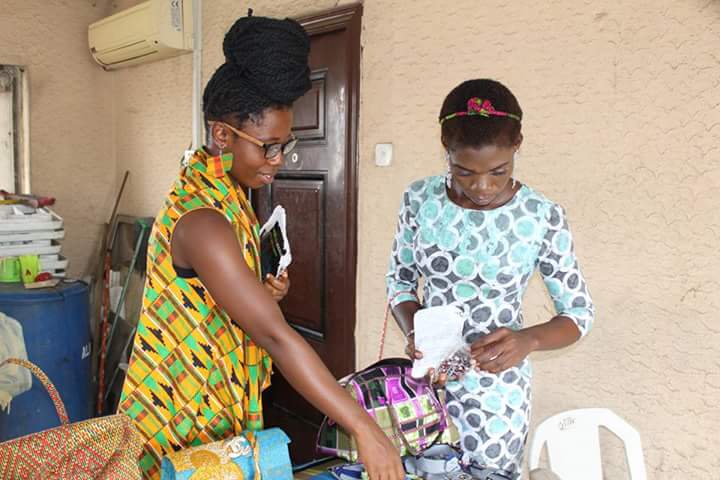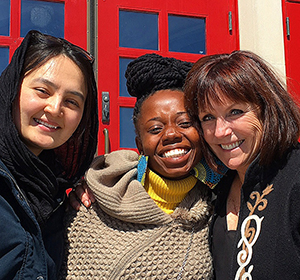Kate Ekanem ‘21 Found the Ability to Help Herself (and Others) on the Internet
She’s been named to the Internet Society’s 25 Under 25 list for the work she’s done to empower women and girls in her native Nigeria.By: Meghan Kita Saturday, September 16, 2017 08:40 AM
 Kate Ekanem '21 (left) on site at a training event to teach women and girls from rural Nigeria to make African-designed earrings and handbags. Photo courtesy Kate Ekanem
Kate Ekanem '21 (left) on site at a training event to teach women and girls from rural Nigeria to make African-designed earrings and handbags. Photo courtesy Kate EkanemWhen Kate Ekanem ‘21 was growing up in Nigeria, she had to fight for an education. When she was 2 years old, her mother died, and the woman her father married next believed strongly in Nigerian cultural norms—namely, that girls are worth less than boys, and that an investment in a girl’s future is not a wise one. When Kate’s father sold a piece of his property to fund her secondary education, it enraged her stepmother.
“I felt depressed and not wanted, like I was less human,” Kate says. “That attracted me to so many girls around me—their brothers were always chosen before them, they were always left out. I felt I needed to address this issue.”
She did that by starting the Kate Tales Foundation, an NGO that seeks to empower women and girls in Nigeria through education and support of their writing and art. The organization has completed more than 20 projects since its inception—including Author’s Talk, an annual event that connects experienced authors with young writers—and has touched the lives of more than 5,000 women and girls.
This weekend, Kate will fly to Los Angeles to accept a 25 Under 25 Award from the Internet Society, a nonprofit whose mission is “to promote the open development, evolution and use of the internet for the benefit of all people throughout the world.” The group is recognizing young people who’ve used the web to do good, and Kate couldn’t have achieved what she has without it.
“The internet was the pillar I relied on,” she says. “I trained myself using the internet. I got information about how to draft proposals, how to reach out to community leaders. All the conferences I’ve attended—and I’ve been to more than 20—I learned about on the internet.”
 Kate ended up at Muhlenberg thanks in part to her mentor Lauren C. Anderson ‘79, an alumna she met in 2015. Anderson was speaking on a panel at the G(irls)20 Summit, an event that brings together young female delegates from across the world to help advance female labor force participation, and Kate was the representative from the African Union.
Kate ended up at Muhlenberg thanks in part to her mentor Lauren C. Anderson ‘79, an alumna she met in 2015. Anderson was speaking on a panel at the G(irls)20 Summit, an event that brings together young female delegates from across the world to help advance female labor force participation, and Kate was the representative from the African Union.
“She’s the best mentor we all had—she kept in touch with all the girls,” Kate says of Anderson (who's pictured here with Mahsheed Mahjor '17 and Kate, photo courtesy Anderson). “I see her like the mother I never had.”
Anderson says Kate stands out among the dozens of young people she mentors for her persistence and her ability to overcome her past. “Situations in her personal life that would have defeated many people just spurred her onward in a way that was breathtaking to me,” Anderson says. “Nothing will stop this young woman. Nothing. You don’t see that in many people.”
Kate, now 23, resisted the idea of college, partially because she didn’t want it to change who she is or her dedication to her NGO. But, Anderson reassured her, “You can be who you want to be, even when you’re in school,” so Kate applied to a few schools, including Muhlenberg. When Kate was in the United States for a United Nations event this past March, Anderson drove her out to visit Muhlenberg. Kate had an encouraging meeting with Chris Hooker-Haring, the former Dean of Admission & Financial Aid, and she appreciated the school’s emphasis on the arts. She came to realize that continuing her education could only help her manage and expand her NGO.
“I’m not giving up on my Foundation, because that’s what has made me what I am today,” Kate says. “But as a leader, you have to keep being relevant. You start dying when you stop learning.”
